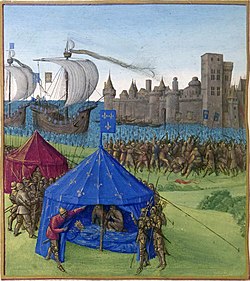Eighth Crusade
| Eighth Crusade | |||||||||
|---|---|---|---|---|---|---|---|---|---|
| Part of the Crusades | |||||||||
 Death of Louis IX during the siege of Tunis |
|||||||||
|
|||||||||
| Belligerents | |||||||||
|
Kingdom of France Kingdom of Naples Kingdom of Navarre |
Hafsid dynasty | ||||||||
| Commanders and leaders | |||||||||
|
Louis IX Charles I of Naples Theobald II of Navarre |
Muhammad I al-Mustansir | ||||||||
The Eighth Crusade was a crusade launched by Louis IX against the city of Tunis in 1270. The Eighth Crusade is sometimes counted as the Seventh, if the Fifth and Sixth Crusades of Frederick II are counted as a single crusade. The Ninth Crusade is sometimes also counted as part of the Eighth. The crusade is considered a failure after Louis died shortly after arriving on the shores of Tunisia, with his disease-ridden army dispersing back to Europe shortly afterwards.
Despite the failure of the Seventh Crusade, which ended in the capture of King Louis by the Mamluks, the King did not lose interest in crusading. He continued to send financial aid and military support to the settlements in Outremer from 1254 to 1266. While the "crusade" of the King's brother Charles of Anjou against the Hohenstaufen Kingdom of Sicily occupied Papal attention for some years, the advance of Baibars in Syria during the early 1260s became increasingly alarming to Christendom. The War of Saint Sabas between Genoa and Venice had drawn in the Crusader States and depleted their resources and manpower. The exhausted settlements were systematically overrun by the methodical campaigns of Baibars. By 1265, he had raided Galilee and destroyed the cathedral of Nazareth, captured Caesarea and Arsuf and temporarily took Haifa. In late 1266, Louis informed Pope Clement IV that he intended to go on crusade again.
...
Wikipedia
